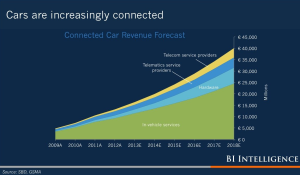A week ago I wrote about the Future of Digital presentation on Business Insider. One of the trends that stood out to me is the projected growth in connected cars (i.e. cars with internet access). With predictions that the global market will grow threefold within five years, I believe that it’s going to be an interesting area if only for the simple reason that many technophobes still buy new cars – and will therefore get exposed to the technology, whether they like it or not.

However, as Forbes recently pointed out, the introduction of these cars will have to get over some significant obstacles first:-
- The development cycle for new cars is significantly longer than normal consumer electronics products (such as mobiles)
- With mandatory eCall systems embedded within cars in Europe that automatically send details of any accidents to emergency services, a controversy has already developed around whether the technology can be used by others to track locations without consent.
- Car dealers will need to up their tech skills to sell the benefits of the vehicles effectively (and honestly).
- It’s not clear whether the cars themselves will have inbuilt systems or simply rely on tethering via the driver’s mobile.
- Car purchases usually involve just one payment. Now consumers have to get used to recurring payments for connected services post-purchase.
- How high will the hurdles be to getting apps in expensive hardware accepted that address quality and driving safety standards?
Despite all of the obvious benefits, as with all significant advances in technology, there are serious privacy considerations to be addressed as the car becomes your best friend. According to the British Insurance Brokers’ Association, some 300,000 cars in the UK are already using telematics devices that capture details of our driving behaviour (such as the speed with which you take corners). And the payoff for letting someone else keep an eye on you? Reduced insurance premiums.
When it comes to tracking, we’ve already seen issues, even at this early stage. A couple of years ago, TomTom faced a backlash when it sold SatNav data to the Dutch police that helped them to place speed traps. Google’s acquisition Waze announced it was trading user data with local governments, passing across the incredibly accurate second-by-second location tracking that it gets from pinging each user’s mobile phone every second in return for updates from each city’s traffic systems. The information is of course supposed to be anonymous in this case.
In recent weeks, two US-based organisations that represent some of the world’s biggest car manufacturers have unveiled an agreement on privacy standards for securing the data that the connected cars will generate. You can check out the principles here. Interestingly, initial commentary views them as falling short of what would be required in Europe were they to apply across the Atlantic.
There’s no doubt that we can look forward to yet another battle to find a balance between valuable consumer products and privacy in the near future.
